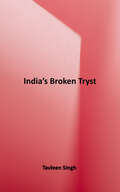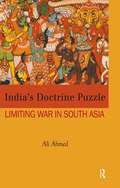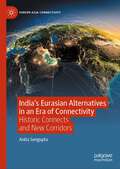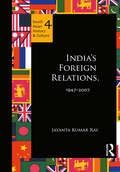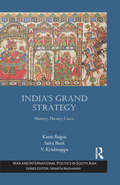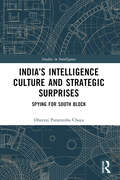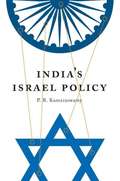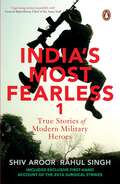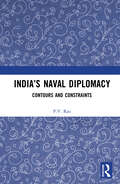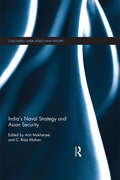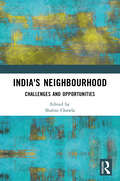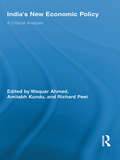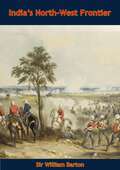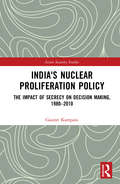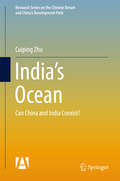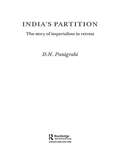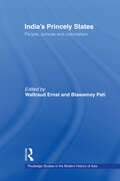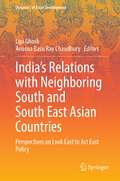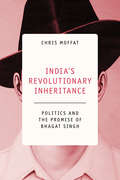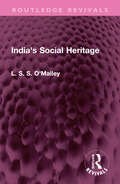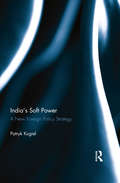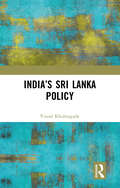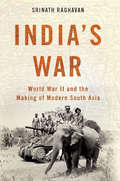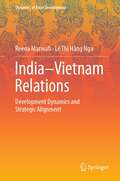- Table View
- List View
India's Broken Tryst
by Tavleen SinghSeventy years after Nehru’s beautiful midnight speech – ‘Long years ago we made a tryst with destiny…’ – in Indian cities and villages millions survive on less than the bare minimum. Children are not in classrooms, women have nowhere safe to relieve themselves, and jobless men lie around in a daze. In cities, where initiative should flourish, a merciless state looms large over every common endeavour. The civilization that was India, that grand culture, has not found utterance again. Long years after freedom from the British, why do we remain suppressed? In India’s Broken Tryst, bestselling author and popular political columnist Tavleen Singh chronicles the damage done. Here is the story of Surekha, who lives on the pavements of Mumbai’s landmark Marine Drive with memories of crushing hunger. Of Ali, the idli seller who is forced out of his honest livelihood by cops and corporators. Of Sahib and Sardar, little boys torn from their mother on the criminal charge of begging. Of those nameless servants who do not have access to toilets even as they service the luxury apartments where Singh lives. From the very poor to the very rich, Tavleen Singh catalogues in bold, eviscerating detail the systematic unmaking of our sense of destiny. Can an Indian dream stretch beyond food and water, literacy, toilets, and in some cases just a document of identification? If not, what destiny?
India's Doctrine Puzzle: Limiting War in South Asia
by Ali AhmedThe balance of power in South Asia is tenuous. Neighbouring states with nuclear arsenal pose a serious threat in times of conflict and the danger of escalation into a nuclear holocaust in South are ever-present. This book locates the change in India’s war doctrine at the turn of the century, following the Kargil War in 1999 between India and Pakistan. It examines how war policy was shaped by the threat posed by India’s neighbours and the need for greater strategic assertion. It also reveals that this change was forced by the military’s need to adapt itself to the nuclear age. Finally, it raises questions of whether the Limited War doctrine has made India more secure. An astute analysis of not only India’s military strategy but also of military doctrine in general, this book will be valuable to scholars and researchers of defence and strategic studies, international relations, peace and conflict studies, South Asia studies as well as government and military institutions.
India’s Eurasian Alternatives in an Era of Connectivity: Historic Connects and New Corridors (Europe-Asia Connectivity)
by Anita SenguptaThe volume examines how in the twenty-first century narratives built around connectivity have become a structural component of international politics expanding into a wider array of policy fields i It examines the significance of this emerging narrative from an Indian perspective with particular reference to Eurasian alternatives. It argues that this represents the next stage of globalization and that an understanding of this is increasingly becoming crucial given the recent disruptions along with the emergence of a spate of new policies and institutions that could eventually lead to a new understanding of connectivity.
India's Foreign Relations, 1947-2007: India's Foreign Relations, 1947-2007 (South Asian History and Culture)
by Jayanta Kumar RayThis book analyses India’s relations with its neighbours (China, Pakistan, Bangladesh, Sri Lanka) and other world powers (USA, UK, and Russia) over a span of 60 years. It traces the roots of independent India’s foreign policy from the Partition and its fallout, its nascent years under Nehru, and non-alignment to the influence of economic liberalization and globalization. The volume delves into the underlying reasons of persistent problems confronting India’s foreign policy-makers, as well as foreign-policy interface with defence and domestic policies. This book will be indispensable to students, scholars and teachers of South Asian studies, international relations, political science, and modern Indian history.
India’s Grand Strategy: History, Theory, Cases (War and International Politics in South Asia)
by Kanti Bajpai Saira Basit V. KrishnappaAs India prepares to take its place in shaping the course of an ‘Asian century’, there are increasing debates about its ‘grand strategy’ and its role in a future world order. This timely and topical book presents a range of historical and contemporary interpretations and case studies on the theme. Drawing upon rich and diverse narratives that have informed India’s strategic discourse, security and foreign policy, it charts a new agenda for strategic thinking on postcolonial India from a non-Western perspective. Comprehensive and insightful, the work will prove indispensable to those in defence and strategic studies, foreign policy, political science, and modern Indian history. It will also interest policy-makers, think-tanks and diplomats.
India’s Intelligence Culture and Strategic Surprises: Spying for South Block (Studies in Intelligence)
by Dheeraj Paramesha ChayaThis book examines India’s foreign intelligence culture and strategic surprises in the 20th century. The work looks at whether there is a distinct way in which India ‘thinks about’ and ‘does’ intelligence, and, by extension, whether this affects the prospects of it being surprised. Drawing on a combination of archival data, secondary source information and interviews with members of the Indian security and intelligence community, the book provides a comprehensive analysis of the evolution of Indian intelligence culture from the ancient period to colonial times and, subsequently, the post-colonial era. This evolutionary culture has played a significant role in explaining the India’s foreign intelligence failure during the occurrences of strategic surprises, such as the 1962 Sino-Indian War and the 1999 Kargil War, while it successfully prepared for surprise attacks like Operation Chenghiz Khan by Pakistan in 1971. The result is that the book argues that the strategic culture of a nation and its interplay with intelligence organisations and operations is important to understanding the conditions for intelligence failures and strategic surprises. This book will be of much interest to students of intelligence studies, strategic studies, Asian politics and International Relations.
India's Israel Policy
by P. R. KumaraswamyIndia's foreign policy toward Israel is a subject of deep dispute. Throughout the twentieth century arguments have raged over the Palestinian problem and the future of bilateral relations. Yet no text comprehensively looks at the attitudes and policies of India toward Israel, especially their development in conjunction with history.P. R. Kumaraswamy is the first to account for India's Israel policy, revealing surprising inconsistencies in positions taken by the country's leaders, such as Mahatma Gandhi and Jawaharlal Nehru, and tracing the crackling tensions between its professed values and realpolitik. Kumaraswamy's findings debunk the belief that India possesses a homogenous policy toward the Middle East. In fact, since the early days of independence, many within India have supported and pursued relations with Israel. Using material derived from archives in both India and Israel, Kumaraswamy investigates the factors that have hindered relations between these two countries despite their numerous commonalities. He also considers how India destabilized relations, the actions that were necessary for normalization to occur, and the directions bilateral relations may take in the future. In his most provocative argument, Kumaraswamy underscores the disproportionate affect of anticolonial sentiments and the Muslim minority on shaping Indian policy.
India's Israel Policy
by P. R. KumaraswamyIndia's foreign policy toward Israel is a subject of deep dispute. Throughout the twentieth century arguments have raged over the Palestinian problem and the future of bilateral relations. Yet no text comprehensively looks at the attitudes and policies of India toward Israel, especially their development in conjunction with history. P. R. Kumaraswamy is the first to account for India's Israel policy, revealing surprising inconsistencies in positions taken by the country's leaders, such as Mahatma Gandhi and Jawaharlal Nehru, and tracing the crackling tensions between its professed values and realpolitik. Kumaraswamy's findings debunk the belief that India possesses a homogenous policy toward the Middle East. In fact, since the early days of independence, many within India have supported and pursued relations with Israel. Using material derived from archives in both India and Israel, Kumaraswamy investigates the factors that have hindered relations between these two countries despite their numerous commonalities. He also considers how India destabilized relations, the actions that were necessary for normalization to occur, and the directions bilateral relations may take in the future. In his most provocative argument, Kumaraswamy underscores the disproportionate affect of anticolonial sentiments and the Muslim minority on shaping Indian policy.
India's Most Fearless True Stories of Modern Military Heroes: True Stories Of Modern Military Heroes
by Rahul Singh Shiv AroorThe Army major who led the legendary September 2016 surgical strikes on terror launch pads across the LoC; a soldier who killed 11 terrorists in 10 days; a Navy officer who sailed into a treacherous port to rescue hundreds from an exploding war; a bleeding Air Force pilot who found himself flying a jet that had become a screaming fireball . . . Their own accounts, or of those who were with them in their final moments. India's Most Fearless covers fourteen true stories of extraordinary courage and fearlessness, providing a glimpse into the kind of heroism our soldiers display in unthinkably hostile conditions and under grave provocation.
India’s Naval Diplomacy: Contours and Constraints
by P.V. RaoThis book studies India’s evolving naval engagements with other nations of the Indian Ocean region. It traces the growth of the Indian Navy and discusses its role as an instrument of meeting national objectives, particularly for furthering foreign policy. The volume analyses themes such as Indian Navy’s (IN) transition from a brown water to blue water force, Indian maritime debates and doctrines, naval ‘bridge-building’ missions, and Sino-Indian maritime competitions. It examines Indian Navy’s regional roles within the broader framework of its diplomatic objectives in particular regions and looks at how keen regional states are to accept India as a crisis manager and would allow it to build a regional maritime security architecture. The author also discusses state control over naval diplomatic roles and investigates if Indian Navy can effectively hedge extra-regional, mainly Chinese, involvement in the Indian Ocean. An important study of India’s naval prowess, this book will be indispensable to students and researchers of political science, international relations, maritime and naval studies, strategic studies, geopolitics, defence studies, conflict studies, diplomacy, Indian Ocean studies, South Asian studies and those interested in India-China maritime rivalry.
India's Naval Strategy and Asian Security (Cass Series: Naval Policy and History)
by C. Raja Mohan Anit MukherjeeThis book examines India’s naval strategy within the context of Asian regional security. Amidst the intensifying geopolitical contestation in the waters of Asia, this book investigates the growing strategic salience of the Indian Navy. Delhi’s expanding economic and military strength has generated a widespread debate on India’s prospects for shaping the balance of power in Asia. This volume provides much needed texture to the abstract debate on India’s rise by focusing on the changing nature of India’s maritime orientation, the recent evolution of its naval strategy, and its emerging defence diplomacy. In tracing the drift of the Navy from the margins of Delhi’s national security consciousness to a central position, analysing the tension between its maritime possibilities and the continentalist mind set, and in examining the gap between the growing external demands for its security contributions and internal ambivalence, this volume offers rare insights into India’s strategic direction at a critical moment in the nation’s evolution. By examining the internal and external dimensions of the Indian naval future, both of which are in dynamic flux, the essays here help a deeper understanding of India’s changing international possibilities and its impact on Asian and global security. This book will be of much interest to students of naval strategy, Asian politics, security studies and IR, in general.
India's Neighbourhood: Challenges and Opportunities
by Shalini ChawlaIndia’s neighbourhood has witnessed crucial developments in the last decade: complex security challenges, looming economic crises, socio-political unrest, border clashes, China’s expanding engagement, India’s rising profile, and the COVID-19 pandemic. Over the last eight years, India has advocated the “Neighbourhood First” policy which ‘focuses on creating mutually beneficial, people-oriented, regional frameworks for stability and prosperity’. India’s neighbourhood presents complex dynamics, and the challenges demand attention and serious consideration in its policy options. The versatile neighbourhood also offers opportunities for India to extend cooperation at the regional level and address common strategic, economic, social and security concerns. India’s Neighbourhood: Challenges and Opportunities with insights of leading experts is a timely contribution to academia, practitioners, and keen readers. The book fills a critical void in the domain of neighbourhood studies and comprehensively analyses India’s bilateral relations with Afghanistan, Bangladesh, Bhutan, China, Iran, the Maldives, Myanmar, Nepal, Pakistan, and Sri Lanka. The book assesses the traditional security challenges like terrorism, examines crucial non-traditional security issues (hydro-politics and climate change), scans the emerging dynamics of rare earth elements and evaluates the wider possibilities of India’s role in stirring regional cooperation in these key areas. Print edition not for sale in South Asia (India, Sri Lanka, Nepal, Bangladesh, Pakistan and Bhutan)
India's New Economic Policy: A Critical Analysis (Routledge Studies in Development and Society)
by Waquar AhmedConventional interpretations of the New Economic Policy introduced in India in 1991 see this program of economic liberalization as transforming the Indian economy and leading to a substantial increase in the rate of India’s economic growth. But in a country like India, growth is not enough. Who benefits from the new growth regime, and can it significantly improve the conditions of livelihood for India’s 800 million people with incomes below $2.00 a day? This edited volume looks at international policy regimes and their national adoption under strategic conditions of economic crisis and coercion, and within longer-term structural changes in the power calculus of global capitalism. The contributors examine long-term growth tendencies, poverty and employment rates at the national level, regional level and local levels in India; the main growth centers; the areas and people left out; the advantages and deficiencies of the existing policy regime, and alternative economic policies for India. Bringing together the leading figures in the discussion on India’s economic policy, this volume is the authoritative critical study of India’s New Economic Policy.
India's North-West Frontier
by Sir William BartonSir William Pell Barton KCIE CSI (29 May 1871 – 28 November 1956) had a distinguished career in the Indian Political Service. He was British Resident in Baroda (1919), Mysore (1920–25) and Hyderabad (1925–30) and was well known as an authority on the North West Frontier and the Princely states during the days of British rule in India. On leaving the service he worked as an historian of the Princely states and was a frequent contributor to periodicals on issues concerning India and Pakistan.In 1893 he passed the Indian Civil Service examinations and left England for the Punjab. He was head of several administered districts in the North West Frontier and would later move to the Indian Political Service initially as Political Agent in the Princely states of Dir, Swat and Chitral.In 1911, Barton was made secretary to Sir George Roos-Keppel, then Chief Commissioner of the North West Frontier. By 1915 he was Judicial Commissioner of the North West Frontier and was briefly British Resident in Baroda in 1919 before returning to the Frontier where he undertook political service in the short Afghan War and became Chief Political Agent with the Waziristan Field Force.Between 1920 and 1925, Barton was British Resident in Mysore and Chief Commissioner of Coorg. In 1925 he was made British Resident in Hyderabad, during which time he further established good relationships in the Princely states and was on good terms with Sir Akbar Hydari. His obituary in The Times states that ‘In all these capacities his quiet manner and innate kindness were linked with discriminating judgment and strength of purpose’.Barton was made a Knight Commander in the Order of the Indian Empire in 1927.
India's Nuclear Proliferation Policy: The Impact of Secrecy on Decision Making, 1980–2010 (Asian Security Studies)
by Gaurav KampaniThis book examines India’s nuclear program, and it shows how secrecy inhibits learning in states and corrodes the capacity of decision-makers to generate optimal policy choices. Focusing on clandestine Indian nuclear proliferation during 1980–2010, the book argues that efficient decision-making is dependent on strongly established knowledge actors, high information turnover and the capacity of leaders to effectively monitor their agents. When secrecy concerns prevent states from institutionalizing these processes, leaders tend to rely more on heuristics and less on rational thought processes in choices involving matters of great political uncertainty and technical complexity. Conversely, decision-making improves as secrecy declines and policy choices become subject to higher levels of scrutiny and contestation. The arguments in this book draw on compelling evidence gathered from interviews conducted by the author, with interviewees including individuals who were involved in nuclear planning in India from 1980 to 2010, such as former cabinet and defence secretaries, the principal secretary to the prime minister, national security advisors, secretaries to the department of atomic energy, military chiefs of staff and their principal staff officers, and commanders of India’s strategic (nuclear) forces. This book will be of much interest to students of nuclear proliferation, Asian politics, strategic studies and International Relations.
India’s Ocean
by Cuiping ZhuThis book focuses on international relations in the Indian Ocean region and covers many policy aspects of Modi's India. Written by leading scholars of international and Indian Ocean studies, this annual report includes both a strategic review and the major events and related data in this region. It also discusses the origin, aims, frameworks and regional and global impact of India's development under the Modi administration, offering readers a full and authentic picture of the most recent developments in India. This year's Annual Report is the fourth of this kind and the only one to include the Indian Ocean region of China.
India's Partition: The Story of Imperialism in Retreat
by Devendra PanigrahiBased on new source material available in both England and India, India's Partition examines the partition in the context of the retreat of the British Empire. The freeing of India from British rule was the result of internal forces in both countries, while the split of the subcontinent along religious lines served as a harbinger for things to come. Panigrahi argues that partition was not a foregone conclusion and was not the favoured option for most of the main parties, but rather was the result of a unique set of circumstances.An erudite exploration of the highly complex relations between India and Britain leading up to independence and the split, India's Partition looks at the leaders who made far-reaching decisions - and their motivations - during this critical time.
India's Princely States: People, Princes and Colonialism (Routledge Studies in the Modern History of Asia)
by Waltraud Ernst Biswamoy PatiThis is an invaluable work looking into new areas relating to India's princely states. Based on an abundance of rarely used archival material, the book sheds new light on diversities related to the princely states such as health policies and practices, gender issues, the states’ military contribution or the mechanisms for controlling or integrating the states. Contributions are from international, reputable scholars, and they present historiographic, analytical and methodological approaches, placing attention to concepts, theories and sources. Inter-disciplinary in nature, this book will appeal to scholars and researchers of South Asia, studies of transnational histories, cultural and racial studies, international politics and economic history and the social history of health and medicine.
India’s Relations with Neighboring South and South East Asian Countries: Perspectives on Look East to Act East Policy (Dynamics of Asian Development)
by Lipi Ghosh Anasua Basu Ray ChaudhuryThis book presents a holistic perspective across various facets of culture, history, politics, economics and strategy in India’s relations with neighbouring South and Southeast Asian countries. This book not only analyses various issues of India’s foreign policy diplomacy but also explores the perspectives of neighbouring countries towards India. It engages experts from India and its South and Southeast Asian neighbours to discuss topics, such as overland linkages, people-to-people interactions, opportunities and implications of India’s Act East policy on its neighbours in changing geopolitical backdrop. The book emphasises on the responses to the COVID-19 pandemic and suggests a greater scope of regional cooperation on emergencies such as health crises in the Bay region. This rich collection of essays has strategic and scholarly relevance for researchers working on a wide range of topics related to development studies, cultural studies, Asian studies as well as policy makers and general readers.
India's Revolutionary Inheritance: Politics and the Promise of Bhagat Singh
by Chris MoffatWhat do anti-colonial histories mean for politics in contemporary India? How can we understand a political terrain that appears crowded with the dead, heroic figures from past struggles who call the living to account and demand action? What role do these 'afterlives' play in the inauguration of new politics and the fashioning of possible futures? In this engaging and innovative analysis of anti-colonial afterlives in modern South Asia, Chris Moffat crafts a framework that takes the dead seriously - not as passive entities, ceremonially invoked, but as active interlocutors and instigators in the present. Focusing on the iconic revolutionary martyr Bhagat Singh (1907–1931), Moffat establishes the problem of inheritance as central to the forms and futures of democracy in this postcolonial polity. Tracing Bhagat Singh's revenant presence in India today, he demonstrates how living communities are animated by a sense of obligation, duty or debt to the dead.
India's Social Heritage (Routledge Revivals)
by L. S. O'MalleyFirst published in 1937, India’s Social Heritage is intended to give a simple statement of the principal features of the social system in pre-independence India. The social system of pre-Independence India retained many features characteristic of an early stage of social growth. Society was still largely communal in the sense that it was organized in groups. Individual life was based on collective standards and had to be in harmony as a unit in a group, to whose interests his own were subordinate. The social system may be described as a synthesis of groups rather than persons, while the joint family was the basis of Hindu law. This book will be of interest to students of history, sociology and South Asian studies.
India’s Soft Power: A New Foreign Policy Strategy
by Patryk KugielIt is sometimes said that, in the 21st century, the country that tells the better story wins, rather than the country whose army can prevail on the battlefield. That ability to attract others, persuade and set the agenda, soft power, plays an increasingly important role in international relations and in Indian foreign policy. However, while most of the rediscovered interest in India has been focused on its hard power attributes, such as its military and economy, this book concentrates on less tangible assets, such as its culture, ideas and people. The first comprehensive analysis of India’s soft power done from an international relations perspective, this book tracks the changes in Indian foreign policy over last two decades to show how soft power strategy, tools and institutions have been given a more prominent place in India’s external affairs. The study evaluates India’s soft power assets and liabilities and shows how the state is trying to make better use of this potential to realise its national interests. It assesses the effectiveness of India’s soft power approach and provides recommendations on possible improvements to make India a major smart power in the future. An intriguing and comprehensive analysis, it will be valuable for students and scholars interested in Indian foreign policy, soft power theory and international relations. Underlining India’s uniqueness, it substantiates the argument that soft power is not confined to the Western world. Thus, it contributes an interesting case study for comparative study of soft powers. Please note: Taylor & Francis does not sell or distribute the Hardback in India, Pakistan, Nepal, Bhutan, Bangladesh and Sri Lanka
India’s Sri Lanka Policy
by Vinod KhobragadeThis book focuses on India’s foreign policy towards Sri Lanka before the Indo-Sri Lanka Accord (ISLA) in July 1987 and India’s military intervention after the ISLA. The post-intervention developments brought strategic changes in India’s Sri Lanka policy. However, after leadership change in both the countries, India confined its policy to moral support and decided to abstain from direct intervention or involvement in Sri Lanka’s domestic politics. After the demise of the LTTE and its leadership in 2009, India played a constructive role in rebuilding infrastructure in Sri Lanka. The book also focuses on the developments of the relationships between India and Sri Lanka in the post-IPKF period and the bilateral developments in the Post - LTTE periods. Print edition not for sale in South Asia (India, Sri Lanka, Nepal, Bangladesh, Pakistan and Bhutan)
India's War: World War II and the Making of Modern South Asia
by Srinath RaghavanIndia's role in World War II has long been overlooked. But as Srinath Raghavan shows in this authoritative account, India did not fight the war as merely an appendage of the British Empire. From the start, India defended its own sub-empire from Imperial Japan and assisted its allies in battles in Italy, East Africa, and the Pacific.The war also brought great changes to the subcontinent. By the war's end, the Indian Army had become the largest volunteer force in history, while many millions more Indians had worked in their nation's rapidly expanding industry and agriculture. This nationwide commitment to victory altered the country's social landscape, overturning assumptions about class and opening up new opportunities for India's most disadvantaged people.The first major account of India during World War II, India's War chronicles how the demands of war forever transformed the country, its economy, its politics, and its people, laying the groundwork for the rise of modern South Asia.
India–Vietnam Relations: Development Dynamics and Strategic Alignment (Dynamics of Asian Development)
by Reena Marwah Lê Thị Hằng NgaThis book provides an in-depth analysis of the close cultural links between India and Vietnam. It discusses the issues of trade negotiations under the Regional Comprehensive Economic Partnership (RCEP) and the Indo-Pacific construct. Issues such as strengthening the economic partnership, contemporary development challenges posed by the COVID-19 pandemic, including weakening supply chains, and geo-strategic tensions are explored in this book. It enriches understanding of the potential of the two countries to develop as manufacturing hubs for the region and beyond. Given the more aggressive posturing by China in 2020, the concluding chapter includes the policy prescriptions with a futuristic vision, for India and Vietnam to catalyze their strategic and bilateral partnership. Well researched and analytical, the book draws extensively from several interviews of experts, diplomats, journalists, businesspersons, and members of the diaspora. It is a must read for students, researchers, think tanks, area study centers, and all institutions engaged in Asian studies, encompassing narratives extending from the developmental to political, from the bilateral to the multilateral and from the geo-economic to the geo-strategic.
